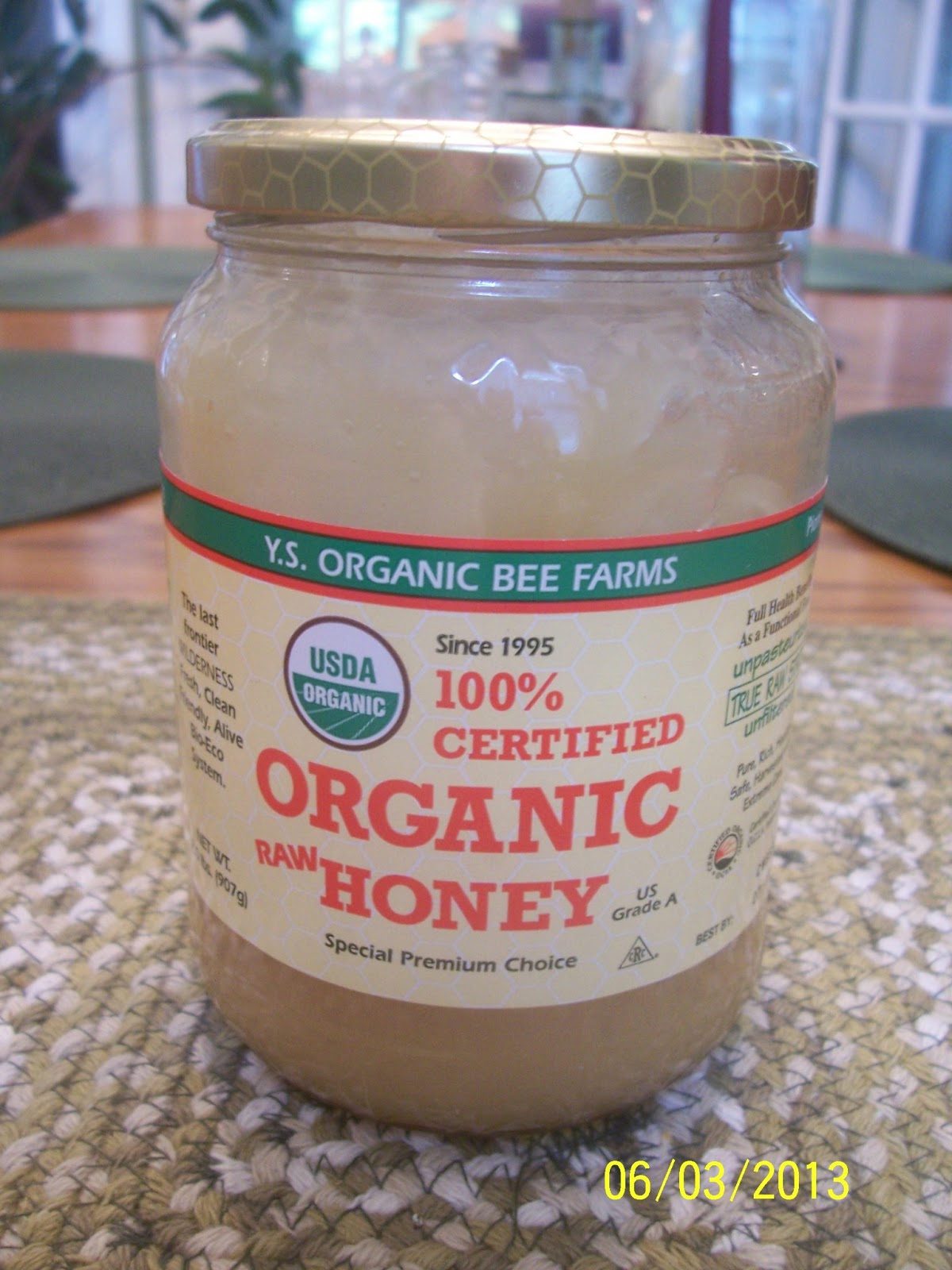Yes, I'm talking about that golden, sticky substance that is manufactured by bees. Honey is the first of the vegan debates I want to tackle. Yes, there are at least two others that I know are being debated among vegans, which include the wearing clothes or shoes from animals, especially leather, instead of buying only cotton, hemp, or synthetic products, and the other debate is regarding green living, which is reducing our carbon footprint instead of consuming gas, paper, etc. and leaving a cleaner world.
 |
| To me, this is the best raw honey around, but it's pricey! Remember that a little honey goes a long way. |
Let me begin by stating that regarding bee or insect cruelty, Dr. Gregor gives an impassioned plea to vegans concerning their arguments of insect-killing in relation to honey production. I've included the article below for you to read for yourself (See: http://health.howstuffworks.com/wellness/food-nutrition/facts/olive-oil-nutrition-facts.htm). Whether nor not you choose to eat honey, the fact is that far more insects are killed every day in other ways that promote plant-based diets and our daily living. Instead of honey, many vegans instead turn to sugar (refined and unrefined), agave nectar, maple syrup, rice syrup, dates, xylitol, stevia, and other forms of sweeteners that may kill many more insects in their production than the bees being killed in the production of honey. It's also very clear to me that some bees will naturally die while producing honey out in Timbuktu, without any human interference. Bees naturally manufacture honey. That's what bees do. Therefore, my belief is that honey does not promote bee cruelty.
Well, what do I think about honey as bee poop or vomit? Well, a site called Honey Bee Suite explains it like I see it. Bees are doing what bees do. In fact the way this site explains it in "Monday morning myths: honey is bee poop" (See: http://www.honeybeesuite.com/monday-morning-myth-honey-is-bee-poop/) is proof that honey is stored in a specialized sac in the bee's anatomy designed for honey making.
Yes, I love raw honey, not just because of its sweetness, but because of its nutritional and health benefits. Honey has a host of vitamins (Vitamin A, Vitamin B-complex, Vitamin C, Vitamin D, Vitamin E, and folic acid) and minerals (calcium, copper, iron, magnesium, manganese, phosphorus, potassium, sodium and zinc). Honey also has an array of antioxidants (pinocembrin, pinobanksin, chrysin and galagin). The antioxidant pinocembrin, which is prevalent in Manuka honey, a very dark and powerfully strong honey often used medicinally, is unique to honey and found in the highest amount relative to other antioxidants. Raw honey contains many micronutrients, including all the pollen and digestive enzymes, which are usually filtered or destroyed during the heating process to liquefy honey instead of keeping it in its crystalized state.
Honey is a known antibiotic (extremely sanitary) that fights infections, aids in healing wounds, and has a plethora of other medicinal uses (See: http://www.benefits-of-honey.com/health-benefits-of-honey.html). During an application of honey to wound, it slowly releases hydrogen peroxide (an antibacterial, antimicrobial, and antiseptic compound) to disinfect, kill germs, and heal ruptured skin. In fact, there is scientific evidence that most strains of harmful bacteria cannot live in the presence of hydrogen peroxide, which is naturally released from honey (See: http://www.benefits-of-honey.com/antibiotic.html).
Now, this is simply my vegan beliefs. You may emphatically have your own beliefs that are opposite mine and I still respect that because I know that at least you stand for something. I know mine goes against the grain of many vegans, but I have my foundation for believing what I do, which is outlined above. If you have not made up your mind on the subject, I always suggest that you do your own research. Google the subject beyond the mainstream links. Dare to find both sides of the argument. Find books on the subject. Please just don't be lazy about it and take what mainstream vegan sites say about it, especially if it causes you to question it.
Today, this vegan will eat something that contains raw honey! I will especially enjoy the benefits it has to offer me nutritionally with a "sanitary" conscience that I have not slaughtered a host of bees. In fact, I'll share exactly what I'm having in the recipe below. It is a very summery light lemon and honey salad dressing.
 |
| Lemon honey dressing in the making. |
ZESTY LEMON HONEY DRESSING
Ingredients:
- 1 tablespoon chopped fresh parsley
- 1 teaspoon fresh lemon zest, organic
- 4 tablespoons fresh lemon juice, organic
- 3 tablespoons raw honey
- 2 teaspoons Dijon mustard
- 2 garlic cloves, pressed
- 1/2 teaspoon salt
- 1/4 teaspoon pepper, or to taste
- 1/3 cup olive oil
- Instructions:
- Chop parsley and zest and squeeze one organic lemon and whisk with the rest of the ingredients in a small bowl. Add oil in slowly, whisking until smooth.
- I ground coarse black pepper on my salad before applying this dressing. Store in refrigerator and let stand at room temperature 15 minutes before serving. Shake before serving.
- ###
 |
| Romaine salad with agave-spelt croutons and lemon honey dressing. |
How do you feel about the honey debate? Feel free to voice your perspective!
No comments:
Post a Comment